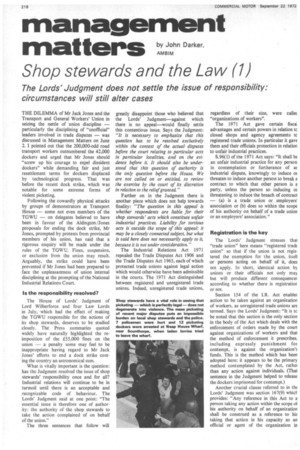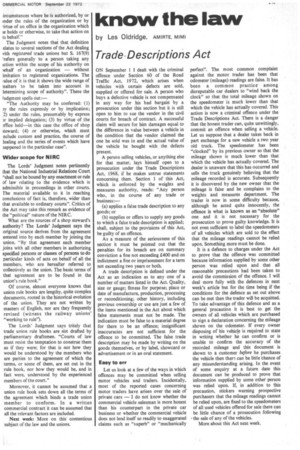management matters
Page 218

Page 219

If you've noticed an error in this article please click here to report it so we can fix it.
by John Darker,
AMBIM
Shop stewards and the Law (1)
The Lords' Judgment does not settle the issue of responsibility: circumstances will still alter cases
THE DILEMMA of Mr Jack Jones and the Transport and General Workers' Union in seizing the nettle of union discipline — particularly the disciplining of "unofficial" leaders involved in trade disputes — was discussed in Management Matters on June 2. I pointed out that the 200,000-odd road transport workers outnumbered the 42,000 dockers and urged that Mr Jones should "screw up his courage to expel dissident dockers" while demanding fair and just resettlement terms for dockers displaced by technological progress. That was before the recent dock strike, which was notable for some extreme forms of violent picketing.
Following the cowardly physical attacks by groups of demonstrators at Transport House — some not even members of the TGWU — on delegates believed to have been in favour of the Aldington /Jones proposals for ending the dock strike, Mr Jones, prompted by protests from provincial members of his union, has said that a rigorous enquiry Will be made under the rules of the TGWU. Fines, suspension, or exclusion from the union may result. Arguably, the strike could have been prevented if Mr Jones had been prepared to face the unpleasantness of union internal disciplining at the prompting of the National Industrial Relations Court.
Is the responsibility resolved?
The House of Lords' Judgment of Lord Wilberforce and four Law Lords in July, which had the effect of making the TGWU responsible for the actions of its shop stewards, deserves to be studied closely. The Press summaries quoted widely have naturally highlighted the reimposition of the £.55,000 fines on the union — a penalty some may feel to be inappropriate having regard to Mr Jack Jones' efforts to end a dock strike costing the country an astronomical sum.
What is vitally important is the question: has the Judgment resolved the issue of shop stewards' responsibility once and for all? Industrial relations will continue to be in turmoil until there is an acceptable and recognizable code of behaviour. The Lords' Judgment said at one point: "The essential issue is therefore one of authority: the authority of the shop stewards to take the action complained of on behalf of the union."
The three sentences that follow will
greatly disappoint those who believed that the Lords' Judgment—against which there is no appeal—would finally settle this contentious issue. Says the Judgment: "It is necessary to emphasize that this question has to be resolved exclusively within the context of the actual disputes before the court relating to particular acts in particular localities, and on the evidence before it. It should also be understood that this question of authority is the only question before the House. We are not called on or entitled to review the exercise by the court of its discretion in relation to the relief granted" Farther on in the Judgment there is another piece which does not help towards finality: "The question in this appeal is whether respondents are liable for their shop stewards' acts which constitute unfair industrial practices. Liability for tortious acts is outside the scope of this appeal: it may be a closely connected subject, but what is said here does not necessarily apply to it, because it is not under consideration."
The Industrial Relations Act 1971 repealed the Trade Disputes Act 1906 and the Trade Disputes Act 1965, each of which protected trade unions against legal action which would otherwise have been admissible in the courts. The 1971 Act distinguished between registered and unregistered trade unions. Indeed, unregistered trade unions, regardless of their size, were caller "organizations of workers".
The 1971 Act gave certain fisca: advantages and certain powers in relation tc closed shops and agency agreements tc registered trade unions. In particular it gave them and their officials protection in relation to unfair industrial practices.
S.96(1) of the 1971 Act says: "It shall bt an unfair industrial practice for any person in contemplation or furtherance of ar industrial dispute, knowingly to induce or threaten to induce another person to break a contract to which that other person is a party, unless the person so inducing m threatening to induce the breach of contract — (a) is a trade union or employers' association or (b) does so within the scope of his authority on behalf of a trade union or an employers' association."
Registration is the key The Lords' Judgment stresses that "trade union" here means "registered trade union" so that if the union is not registered the exemption for the union, itself or persons acting on behalf of it, does not apply. In 'short, identical action by unions or their officials not only may but will produce different consequence5 according to whether there is registration or not.
Section 154 of the I.R. Act enables action to be taken against an organization of workers, as unregistered trade unions arc termed. Says the Lords' Judgment: "It is tc be noted that this section is the only section in the body of the Act which deals with the enforcement of orders made by the court against organizations of workers and that the method of enforcement it prescribes, including expressly punishment for contempt, is against the organization's funds. This is the method which has been adopted here: it appears to be the primary method contemplated by the Act, rather than any action against individuals. (Thal sentence in the Judgment helped to release the dockers imprisoned for contempt.)
Another crucial clause referred to in the Lords' Judgment was section 167(9) whiclprovides: "Any reference in this Act to a person taking any action within the scope of his authority on behalf of an organization shall be construed as a reference to his taking that action in his capacity as an official or agent of the organization in
ircumstances where he is authorized, by or inder the rules of the organization or by rirtue of an office in the organization which ie holds or otherwise, to take that action on is behalf."
The Judgment notes that that definition elates to several sections of the Act dealing vith registered trade unions but S. 167(9) 'refers generally to a person taking any talon within the scope of his authority on )ehalf of an organization — without imitation to registered organizations. The ralue of it is that it shows the wide range of natters to be taken into account in ietermining scope of authority". These the fudgment spells out:— "The Authority may be conferred: (1) iy the rules expressly or by implication; .2) under the rules, presumably by express m. implied delegation; (3) by virtue of the iffice held—in this case the office of shop aeward; (4) or otherwise, which must nclude custom and practice, the course of leafing and the series of events which have iappened in the particular case".
Wider scope for N I RC The Lords' Judgment notes pertinently that the National Industrial Relations Court 'shall not be bound by any enactment or rule of law relating to the evidence which is admissible in proceedings in other courts. The material available to it in reaching conclusions of fact is, therefore, wider than that available to ordinary courts". Critics of the Act may take this remark as evidence of the "political" nature of the NIRC.
What are the sources of a shop steward's authority? The Lords' Judgment says the original source derives from the agreement entered into by each member by joining the union. "By that agreement each member joins with all other members in authorizing specified persons or classes of persons to do particular kinds of acts on behalf of all the members, who are hereafter referred to collectively as the union. The basic terms of that agreement are to be found in the union's rule book."
Of course, almost everyone knows that union rule books are lengthy, quite complex documents, rooted in the historical evolution of the union. They are not written by masters of English, nor are they frequently revised (witness the railway unions' "working to rule").
The Lords' Judgment says tritely that trade union rule books are not drafted by parliamentary draftsmen. "Courts of law must resist the temptation to construe them as if they were; for that is not how they would be understood by the members who are parties to the agreement of which the terms, or some of them, are set out in the rule book, nor how they would be, and in fact were, understood by the experienced members of the court."
Moreover, it cannot be assumed that a union rule book sets down all the terms of the agreement which binds a trade union member to conform. In a written commercial contract it can be assumed that all the relevant factors are included.
Next week: More on this contentious subject of the law and the unions.
































































































































































































































































































































































































































































































































